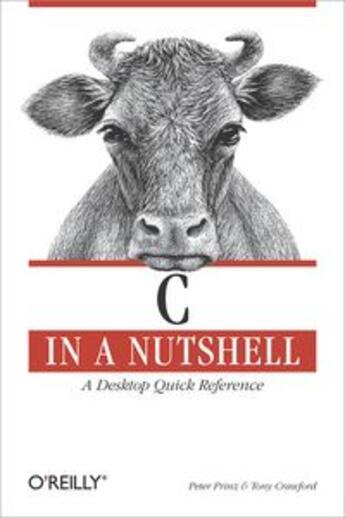Des idées de lecture pour ce début d'année !
Passionné(e) de lecture ? Inscrivez-vous
gratuitement ou connectez-vous pour rejoindre la
communauté et bénéficier de toutes les fonctionnalités du site !

Learning a language--any language--involves a process wherein you learn to rely less and less on instruction and more increasingly on the aspects of the language you've mastered. Whether you're learning French, Java, or C, at some point you'll set aside the tutorial and attempt to converse on your own. It's not necessary to know every subtle facet of French in order to speak it well, especially if there's a good dictionary available. Likewise, C programmers don't need to memorize every detail of C in order to write good programs. What they need instead is a reliable, comprehensive reference that they can keep nearby. C in a Nutshell is that reference.
This long-awaited book is a complete reference to the C programming language and C runtime library. Its purpose is to serve as a convenient, reliable companion in your day-to-day work as a C programmer. C in a Nutshell covers virtually everything you need to program in C, describing all the elements of the language and illustrating their use with numerous examples.
The book is divided into three distinct parts. The first part is a fast-paced description, reminiscent of the classic Kernighan & Ritchie text on which many C programmers cut their teeth. It focuses specifically on the C language and preprocessor directives, including extensions introduced to the ANSI standard in 1999. These topics and others are covered:
Numeric constants Implicit and explicit type conversions Expressions and operators Functions Fixed-length and variable-length arrays Pointers Dynamic memory management Input and output The second part of the book is a comprehensive reference to the C runtime library; it includes an overview of the contents of the standard headers and a description of each standard library function. Part III provides the necessary knowledge of the C programmer's basic tools: the compiler, the make utility, and the debugger. The tools described here are those in the GNU software collection.
C in a Nutshell is the perfect companion to K&R, and destined to be the most reached-for reference on your desk.
Il n'y a pas encore de discussion sur ce livre
Soyez le premier à en lancer une !

Des idées de lecture pour ce début d'année !

Si certaines sont impressionnantes et effrayantes, d'autres sont drôles et rassurantes !

A gagner : la BD jeunesse adaptée du classique de Mary Shelley !

Caraïbes, 1492. "Ce sont ceux qui ont posé le pied sur ces terres qui ont amené la barbarie, la torture, la cruauté, la destruction des lieux, la mort..."